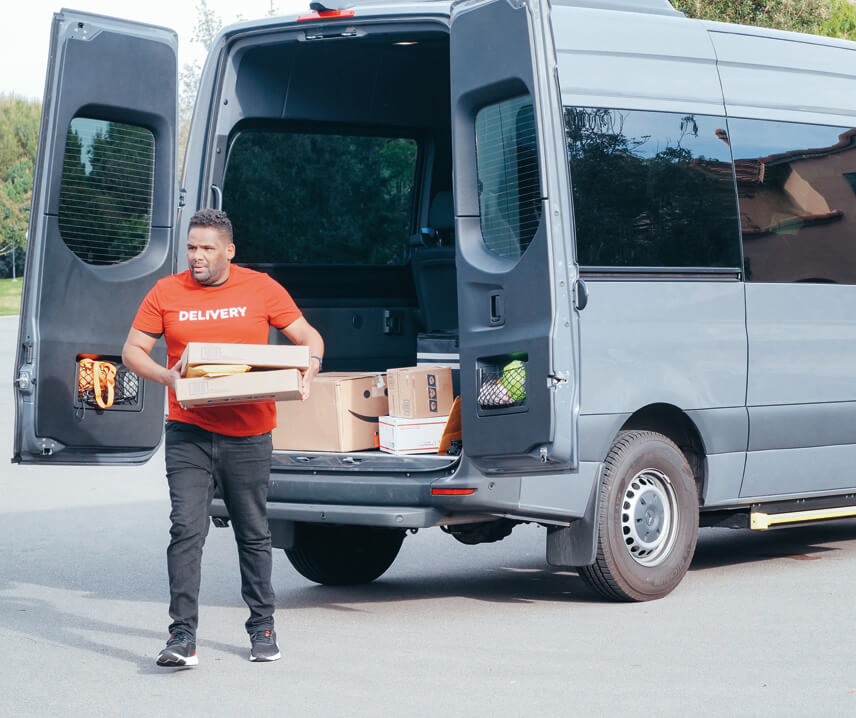
During the COVID-19 pandemic, many smaller businesses have managed to stay afloat by taking on outsourced delivery work from larger courier firms, using their own vans for local deliveries. What new policies and procedures should you be putting in place to protect drivers and your business, and do you need to add more cover to your fleet van insurance or courier insurance policies?
The global COVID-19 pandemic and high street lockdowns combined with the growth of online retail portals is changing the way UK customers shop. It’s also changing the nations’ roads too with couriers and delivery vans taking centre stage on UK highways.
Many fleet transport companies are now pivoting their businesses to delivery schedules over multiple locations and are adjusting their insurance coverage accordingly. One area of significance is what’s been termed ‘last mile delivery’ which still has implications for fleet van insurance, goods in transit insurance and for those wishing to turn their business to becoming a courier.
A recent survey by Europcar Vans and Trucks has underlined the huge significance of small vans for UK businesses. The research conducted amongst UK businesses before the pandemic, found that more than 58 percent of UK businesses use their vans every day of the week, with another 23 percent using them for between four and six days per week.
What is Last Mile Delivery?
‘Last mile’ is a term used in supply chain management and transportation planning to describe the last leg of a journey, comprising the movement of people and goods from a transportation hub to its final destination.
Online retailers and delivery services such as Amazon and Hermes now run huge regional distribution centres which serve the UK network. Further delivery from there to the customer utilises last mile delivery, as goods are despatched through a network of often independent van fleets or van couriers.
Many companies have turned to ‘last mile’ to keep their businesses afloat and their vans moving during the pandemic. The appropriate courier insurance can offer protection for drivers, the customer and the consignment itself. Imagine what would happen if your delivery driver injured someone or damaged a customer’s property while making a delivery? The legal fees associated with these situations are often immense.
The switch to delivery throughout the pandemic has meant that customer complaints have trebled in 2020, with many lost or damaged parcels or issues from delivering the wrong item. Although the last mile is key to customer satisfaction, it can also be the costliest and most laborious part of the shipping process.
Correct Insurance for Deliveries
Last mile usually involves a lot of van stops with small drop sizes. In residential and rural areas, a delivery point along one route can be several miles apart but in cities you have to tackle traffic congestion and multiple delays. Couriers need to examine loss prevention techniques to avoid last mile delivery mistakes.
If you are switching your business to courier, you should check with your insurance broker that you are appropriately covered to protect you against the unique risks you face. Many insurance options remain the same whether a solo courier driver or looking after a fleet of vans. As a courier, you will need to make sure you are covered for:
- Loss or damage to your cargo
- Loss or damage to your vans
- Van recovery in the event of a breakdown or accident
- Damage to your vehicles’ windscreens and windows
- Replacement locks if your keys are stolen
- Public liability insurance to protect your company and the general public, including costly legal fees and help towards medical expenses
- Employers’ liability to protect your drivers
Whilst most companies will already have significant motor trade insurance already in place, it may not be sufficient to cover you for a change in business use. Incorporating goods in transit insurance will cover all your cargo from theft, loss or damage while being transported by your company from one place to another. Some van or courier insurance policies can include an element of goods in transit cover, but only up to a certain value which may not be enough for high-end items.